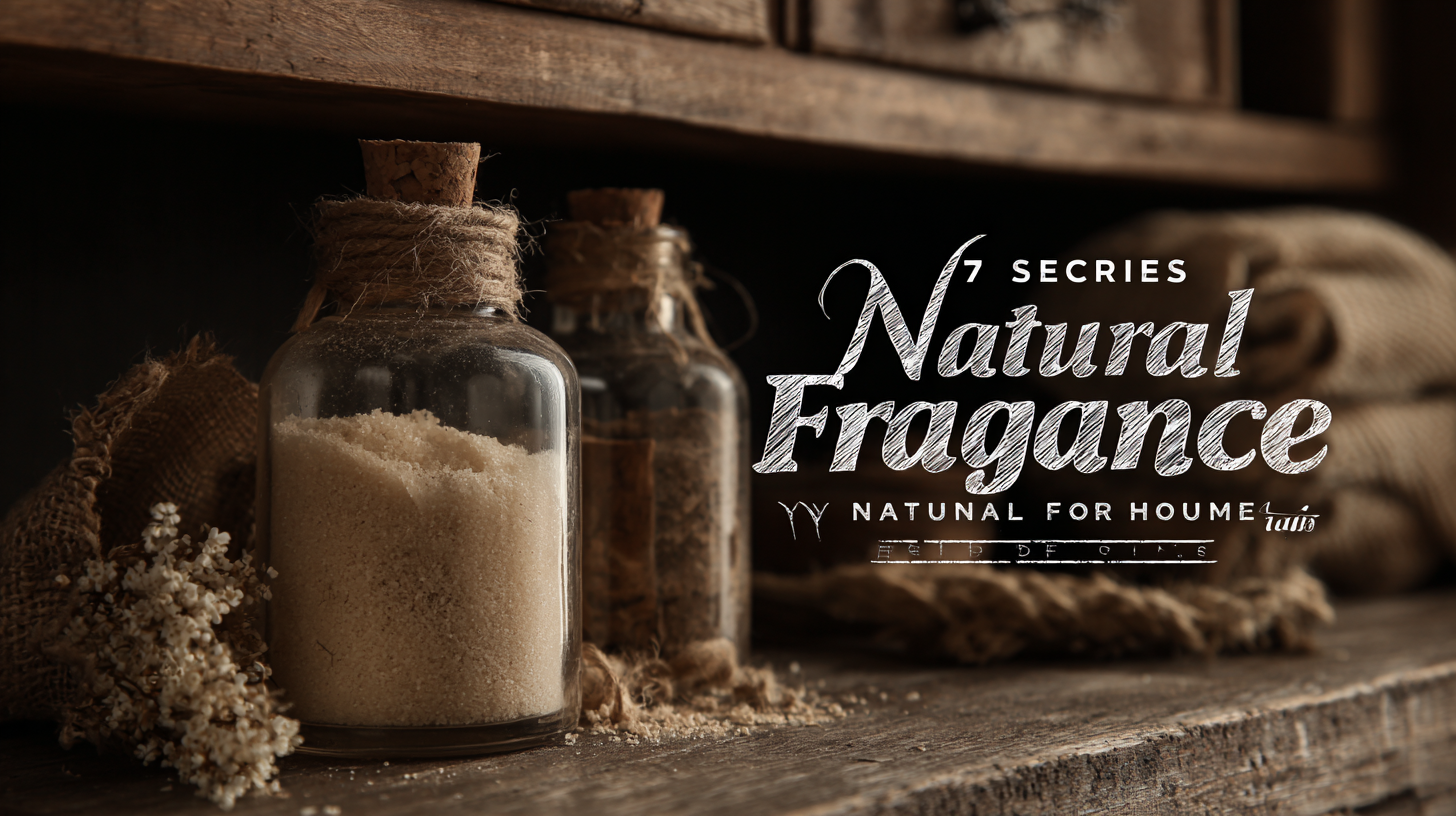
7 Secrets to Choosing the Best Natural Fragrance for Your Home
Natural fragrance has gained significant popularity in recent years, with the global market projected to reach $20.5 billion by 2025, driven by the increasing consumer awareness towards sustainable living and wellness products. As more people seek alternatives to synthetic scents, understanding how to choose the right natural fragrance for your home becomes essential. A recent study revealed that 55% of consumers prefer environmentally friendly products in their households, highlighting the shift towards natural options that not only elevate ambiance but also promote health and well-being. This guide unveils the seven secrets to selecting the best natural fragrance, emphasizing key factors such as sourcing quality ingredients, considering scent profiles, and aligning with personal values to create a harmonious living space that enhances both mood and environment. By making informed choices, you can transform your home into a fragrant sanctuary that reflects your commitment to sustainability and well-being.

Understanding Natural Fragrances: What to Look For
When it comes to selecting the best natural fragrance for your home, understanding the key elements of natural fragrances is essential. Begin by examining the ingredients in the products you consider. Look for those made with essential oils derived from plants, as these not only provide genuine scents but also carry various health benefits. Be cautious of synthetic additives, which can detract from the authenticity and purity of the fragrance. Choose products that prioritize transparency in their ingredient lists to ensure you’re bringing the best nature has to offer into your space.
Another critical aspect is the scent notes themselves. Natural fragrances can vary widely in composition, often categorized into top, middle, and base notes. Top notes are the initial scents that provide an immediate impression, while middle notes develop after the top notes fade, lending complexity and heart to the fragrance. Base notes anchor the fragrance and provide lasting depth. By familiarizing yourself with these notes and experimenting with blends, you can tailor your home’s atmosphere to create a truly inviting environment that reflects your personal style and mood.
7 Secrets to Choosing the Best Natural Fragrance for Your Home
The Importance of Scent Profiles in Home Aromatherapy
When it comes to home aromatherapy, understanding scent profiles is essential. Different scents can have varied effects on our mood and overall well-being. For instance, citrus scents can energize and uplift, while lavender offers calming and relaxing properties. By selecting fragrances that align with your emotional needs or the atmosphere you wish to create, you can optimize your home environment for mindfulness and tranquility.
One effective way to introduce these scents into your home is through essential oil diffusers. These devices not only disperse fragrant vapors but can also enhance the therapeutic benefits of essential oils. When using essential oils, it's crucial to prioritize safety, especially around children. Always choose high-quality oils and dilute them appropriately to avoid any adverse reactions.
Tips for choosing the right scent profile include considering the time of day and activities in your home. For instance, use invigorating scents like mint or lemon during the morning to boost productivity, while opting for soothing fragrances like chamomile or sandalwood in the evening to promote relaxation. Regularly experimenting with different essential oils can help you discover what makes your space feel most inviting and conducive to relaxation.
7 Secrets to Choosing the Best Natural Fragrance for Your Home - The Importance of Scent Profiles in Home Aromatherapy
| Scent Profile | Main Notes | Mood Enhancement | Best Uses | Essential Oils |
|---|---|---|---|---|
| Citrus | Lemon, Orange, Grapefruit | Energizing | Living Rooms, Kitchens | Lemon Oil, Sweet Orange Oil |
| Floral | Lavender, Rose, Jasmine | Relaxing | Bathrooms, Bedrooms | Lavender Oil, Rose Oil |
| Herbal | Mint, Sage, Rosemary | Refreshing | Offices, Study Rooms | Peppermint Oil, Sage Oil |
| Woody | Cedarwood, Sandalwood, Patchouli | Grounding | Living Spaces, Dens | Cedarwood Oil, Sandalwood Oil |
| Spicy | Cinnamon, Clove, Ginger | Comforting | Kitchens, Dining Areas | Cinnamon Oil, Clove Oil |
Evaluating Ingredients: Safe vs. Harmful Compounds
 When selecting natural fragrances for your home, evaluating the ingredients is crucial. Many commercial air fresheners contain volatile organic compounds (VOCs) that can adversely affect indoor air quality. According to a study published in the journal "Environmental Science & Technology", an average household aerosol air freshener can contain up to 40 potentially harmful compounds, including phthalates and synthetic musks, which have been linked to reproductive and endocrine disruption. This emphasizes the importance of scrutinizing the ingredient list of any product you are considering.
When selecting natural fragrances for your home, evaluating the ingredients is crucial. Many commercial air fresheners contain volatile organic compounds (VOCs) that can adversely affect indoor air quality. According to a study published in the journal "Environmental Science & Technology", an average household aerosol air freshener can contain up to 40 potentially harmful compounds, including phthalates and synthetic musks, which have been linked to reproductive and endocrine disruption. This emphasizes the importance of scrutinizing the ingredient list of any product you are considering.
In contrast, natural fragrances utilize plant-based ingredients that can provide a safer alternative. Reports from the Environmental Working Group (EWG) highlight that products derived from essential oils, such as lavender or eucalyptus, not only provide pleasant scents but also offer antimicrobial properties. Furthermore, EWG's Skin Deep database notes that many natural brands prioritize transparency, allowing consumers to make informed choices. By opting for fragrances that list 100% natural ingredients, you minimize exposure to harmful compounds, creating a healthier environment in your home.
Choosing the Right Delivery Method: Diffusers, Candles, or Sprays
When it comes to choosing the right delivery method for natural fragrances in your home, the options can be overwhelming. The most popular methods—diffusers, candles, and sprays—each offer unique benefits that can enhance your living space. According to recent industry reports, essential oil diffusers have seen a significant rise in popularity, with a projected growth of over 30% in the next few years. This surge is primarily due to their ability to disperse fragrances evenly throughout a room and their ease of use, particularly models with larger water tanks that don't require constant refills.

Candles, on the other hand, provide not just fragrance but also a warm ambiance. The market for scented candles is expected to expand as consumers look for ways to create a cozy atmosphere at home. Following ongoing trends, layering fragrances—combining gourmand scents like vanilla with woodsy notes—can create a more complex and inviting olfactory experience. It’s essential to experiment with different combinations and delivery methods to find what resonates best with your personal style and home environment, ensuring that your space always smells amazing.
Sustainability Matters: Eco-Friendly Packaging and Ingredients
In recent years, the demand for eco-friendly products has surged, with
77% of consumers indicating that they would buy a product if it had a sustainable packaging option, according to a report by Nielsen. This shift towards sustainability is particularly evident in the fragrance industry, where brands are now prioritizing natural materials and environmentally conscious practices in both their ingredients and packaging. As many consumers seek to create a more organic and toxin-free atmosphere at home, the importance of selecting fragrances that adhere to these principles cannot be overstated.
When choosing natural home fragrances, one should look for products that feature biodegradable or recyclable packaging, reducing waste and minimizing environmental impact. Studies show that sustainable packaging not only appeals to consumers but also enhances brand loyalty, with 60% of shoppers willing to pay more for products that are sustainably packaged. Additionally, brands are increasingly using responsibly sourced ingredients, which not only supports ethical practices but also promotes biodiversity. As conscious consumers, aligning with brands that prioritize sustainability not only elevates our living spaces but contributes positively to the planet.
